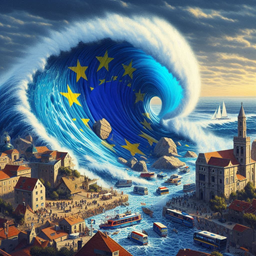By Ron Raskin

In these times, when it has become fashionable to criticize Israel—no matter what it does or doesn’t do—even the UK is now pressuring Israel, threatening to recognize a Palestinian state without any peace agreement or concessions from the Palestinians in return. The big question is: Why? Doesn’t Europe understand the situation?
And I’m not referring to the average European citizen, but rather to those behind the propaganda machine—the political elites and leaders of countries like France and the UK. The uncomfortable truth is that they do understand. And here’s what seems to be driving them:
- Reaction to Israel non-binding vote to annex the West Bank
- The Timeline of a Political Tsunami:
- July 10 – The EU reaches an agreement with Israel to expand humanitarian access
- July 23 – 71 Knesset members (out of 120) vote in favor of a non-binding motion to annex the West Bank
- July 24 – France declares it will recognize a Palestinian state
- July 25 – The New York Times publishes the photo of Mohamed Zakariya Ayyoub al-Matouq on its front page
- July 26 – Israel declares a humanitarian pause
- July 29 – The UK announces it will recognize a Palestinian state
- Though there is no direct proof, the timeline above might suggests that the tsunami may be related to the Knesset’s vote on the non-binding declaration to annex the West Bank
- The Timeline of a Political Tsunami:
- Saudi Arabia
Saudi Arabia is increasingly seen as the key battleground in the wider struggle between Radic al Islam and the free world. It is a strategic Western bridgehead in the Muslim world—a country central to Islamic identity, and a symbol of hope for future coexistence between Western and Islamic civilizations. No one of course believe that Palestinian state will bring peace and stability but the price for Saudi “friendship” appears to be the betrayal of Israel, and Europe seems increasingly willing to pay it. - Strategic Retreat
Just as Israel withdrew from Gaza nearly 20 years ago because staying had become too costly and difficult, Europe now essentially calls for a withdrawal from Israel itself (that’s what the BBC and other major European outlets that are slamming Israel are really all about) —to supposedly “better” positions. From the European perspective, such a retreat would strike a blow at what unites Islamists, reducing hatred and, by extension, weakening the energy behind radical Islam. Has Europe already forgotten the lesson of the Munich Pact? As formulated once by Winston Churchill: “You were given the choice between war and dishonor. You chose dishonor, and you will have war.” Not exactly—Europe has simply learned that betrayal must be planned in advance and justified by something—either by framing it as “parental guidance for a lost child,” or by placing the blame on Israel itself. Ironically, Israel has helped enable this narrative by walking straight into Hamas’s trap with eyes wide shut.
- Values
Values are often treated as abstract or secondary—but they are foundational. Values create unity, foster trust, and build strength. Even if Israel hasn’t truly violated Western values and has merely operated at the edge, the perception that it has crossed a line is enough to trigger alarm bells among European leaders—and presents a useful opportunity to reaffirm those values in order to reinforce internal unity. - Internal Politics
Although the importance of internal politics in such decisions is sometimes exaggerated (in many cases, most of the people believe whatever their elites have told them to believe), it still has an effect. At the end of the day, European countries are democracies—and if enough people believe in something, their leaders will be forced to align.
When taking all of this into account, the key question becomes: Where is the Western world heading? And what should Israel—and the West more broadly—have done differently? I believe the answer lies in a fundamental misunderstanding of the nature of this conflict. Radical Islam—in Lebanon, Iraq, Yemen, and beyond—has one long-term, strategic goal: to unite the Islamic world into a single supernation, with shared myths, values, and enemies. Everything else is secondary: the suffering of Muslim civilians, the loss of military equipment, economic collapse—none of it truly matters to the leaders of radical Islam. In fact, collective suffering serves as a unifying force. Shared pain creates unbreakable bonds.
If the West—including Israel—fails to recognize the power and purpose of this goal, and fails to formulate a counter-goal of its own, it places itself in grave danger. The October 7th attack could have served as a catalyst to unite the Western world. But neither Israel nor the broader West understood that opportunity—or were willing to act on it. Instead, Israel places its hopes in a decisive military victory to guarantee its security, while Europe wagers on strategic diplomacy and political maneuvering to achieve the same goal.
The result? Everything outlined in the five points above.
In this clash of civilizations, the side that succeeds in building unity first will be the side that wins. It is time to wake up. It is time for a New Western Doctrine.


First of all, it is strange to think that the elites of European countries have the same values. This was not true before and is not true now. Churchill’s quote in the article is a typical example of the different values in the past. Recent statements by the leaders of France and Germany are an example of today’s disagreements.
Secondly, the goals of the elite are power and enrichment, these are their main values, and these are the goals that will be controlled in the media. If we assume that SA is the key to these goals (as the author did in this article), then there is no need to invent anything additional, since these are already sufficient reasons for such behavior of the elites.
Thirdly, it is almost impossible to control demography, especially increasing the birth rate. Even countries like Russia, where terrible laws are passed, the purpose of which is to increase the birth rate, the result is exactly the opposite: working families have fewer children, non-working families have more. In Europe, the equivalent is the influx of non-working migrants, and a decrease in the birth rate among the native population.
To summarize all of the above, it is a time to admit that there is no such a thing “common pan-European values”, and the chance is rather in the creation of “corporate states” according to the common values, when the problem of a common language disappears. But it hardly makes sense to predict so far ahead.
Liberty, freedom, democracy, and the value of human life—these are already widely accepted in the West. But the real question is whether the free world will recognize the importance of alignment and unity. I don’t know the answer—but I do have hope…